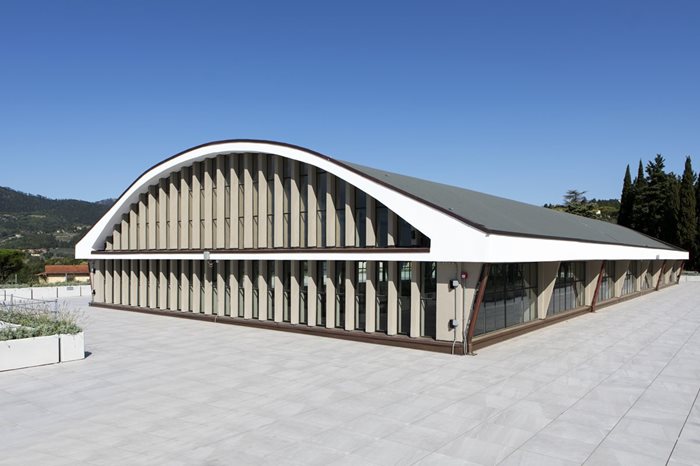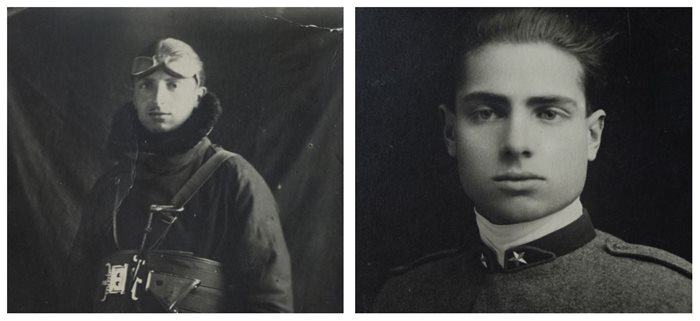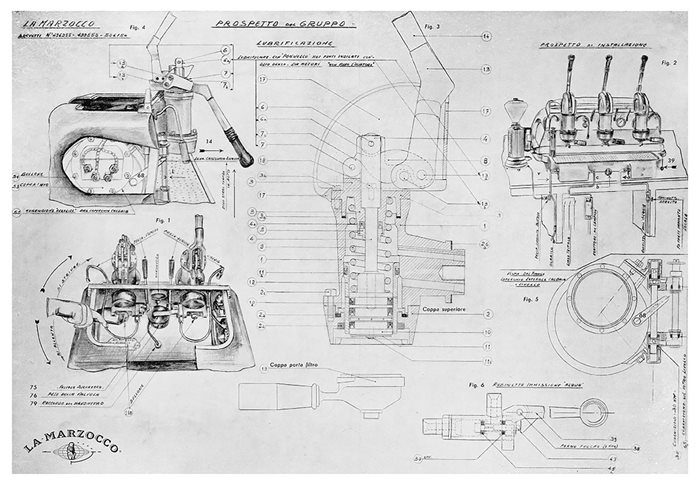The last few months have piled extraordinary pressure on both people and the businesses they rely upon. In an exclusive interview with
5THWAVE Guido Bernardinelli, CEO, La Marzocco International, discusses how the legendary espresso machine manufacturer has navigated adversity over the past year, how crisis can be turned into opportunity – and the enduring importance of heritage and humanity in business
.jpg.aspx?width=700&height=460)
Main image: La Marzocco's Gran Bar Accademia espresso bar | Inset: Guido Bernardinelli, CEO, La Marzocco International | Photo credit: La Marzocco International
La Marzocco has grown from an artisan business to a formidable international company. What is the secret behind its success?
For the longest time La Marzocco founders
Giuseppe and Bruno Bambi worked from a small artisan workshop in Florence. They were making every machine individually, each one a unique sculpture designed to the specifications of local coffee shops. Never did they dream that their products would be sold beyond Florence and across international markets.
Instead of looking for profit per se, we sought to become profitable as people first
There is no secret recipe to our international success today, but we are driven by the same obsession as the Bambi brothers: We are obsessed with coffee, success and quality. We are also obsessed with providing our customers with the best solutions so that they can thrive in the coffee market.
Instead of looking for profit
per se, we sought to become profitable as people first. We believe that if we can make others profit from our initiative, obsession and enthusiasm – at all levels of the coffee community, from our customers to our employees – then we can forge better inspiration and cohesion across the coffee industry and beyond. These are qualities I believe the world is hungry for.
Tell us about La Marzocco’s Accademia Del Caffè Espresso
It all started quite spontaneously when La Marzocco was in the process of moving out of the original factory buildings designed and developed by the Bambi brothers.
We felt leaving those buildings, which contain the history of the company since its foundation in 1927, did not feel right. So, after much conversation between myself Lorenzo Carboni, Kent Bakke and Chris Salierno, we decided to refurbish the building. We wanted to create a centre of cultural understanding for espresso and coffee, a place from which we could give more back to origin, research and design.

The Accademia del Caffè Espresso housed in La Marzocco’s original factory building | Photo credit: La Marzocco International
We wanted to
revitalise the original factory as it was with some of the original shop workers, some of whom were in their teens when they started, and, now in their 50s still had many years of career ahead of them. Many of them were working in the same place, with the same machines and tools.
With this rich history and resource at our disposal we can manufacture custom-made and special lines of machines much more efficiently. We can engage in more profound and educational relationships with our customers and we can educate younger generations.
What has the impact of Covid-19 been on your business?
The impact on the business has been severe, but it could have been worse. I like to be optimistic, because as business people we also need to seize opportunities. In order to create important projects like Accademia, we need to be successful for our customers and our employees.
At La Marzocco we have a very talented team that has been successful in adapting to markets experiencing different stages of the pandemic. While many European nations continue to endure lockdowns, China’s recovery has been more rapid, for example.
In doing so, our team has been able to motivate customers, who rely on us for their own success. Many coffee shops have reopened for takeaway and, depending on the market, have experienced at least brief periods where restrictions eased and sales recovered.
So, taking the average of these negative and favourable situations, we have generated enough revenue to support our employee salaries and company expenses. Fortunately, this means we have not made any redundancies during the pandemic.
"As a company we have had the opportunity to examine ourselves inside and out"
We have a saying at La Marzocco, ‘what we focus on expands’, and with that in mind we are also focussing more on the at-home coffee market. Consumers may not be able to go to their favourite coffee shop, but they want to keep their coffee rituals – so we can bring the café to their homes. Subsequently, bean-to-cup machines are becoming more desirable than pod and capsule machines because consumers want their coffee a little fresher and are becoming more concerned about capsule waste.
We are now turning our attention to the post-Covid world, because it is going to take time for people to resume their daily routines after so much home working and employees being furloughed. We will no doubt have to forge a ‘new normal’, but I am confident that people will return to coffee shops.
.jpg.aspx?width=700&height=466)
A La Marzocco timeline exhibition featuring an Alfa Romeo van converted into a travelling showroom by Giuseppe Bambi in the 1960s | Photo credit: La Marzocco International
How do you view the human impact of Covid-19?
I am still flabbergasted at the global situation, and to be honest I am very disappointed as a human being. We are witnessing the end of globalisation when we see governments dealing with a global tragedy individually and not collectively. There has been next to zero discussion between the G8 or G20 countries to devise an international solution to the pandemic. That has broken my heart.
It is a tragedy to observe the people that are not here any longer, the older generations and deaths in retirement homes – a whole generation has passed away. These are the people who liberated the Western world. They fought for what we have today. They are the people who paved the way for us to be here today and talk to each other. And that makes me sad.
Do you see any positives emerging from Covid-19?
Just look at the extra time we have had to spend with our families and friends, the time we have to communicate, take stock and slow down. Being busy does not necessarily mean being productive. Just as the things we like to eat may not be good for our health, as a society we are realising that financial gain through abusing the planet is no good for humanity.
As a company we have had the opportunity to examine ourselves inside and out. For example, we have completely digitalised our factory, a process that was scheduled to last two years or longer.
We have launched our grinder manufacturing business much sooner than anticipated and we have been able to rigorously test Thanks to advanced IT platforms, such as Cisco, Sap, Jabber and other intranets, we have been able to foster greater collaboration between our teams. We are also seeking to elevate the café experience at home by enabling product connectivity with a dedicated app.


Top left: Bruno Bambi pictured in the Italian Airforce, circa 1920 | Top right: Giuseppe Bambi pictured in 1924 | Bottom: La Marzocco’s original lever espresso machine design sketches | Photos credit: La Marzocco International
What lies in the future for the coffee industry?
As Covid-19 has taught us, it is very difficult to predict the future. I believe that the past is gone and has inspired what we are today, but the future we cannot know.
Nevertheless, in the long term I predict that people will not only continue toenjoy coffee, they will fall deeper in love with it. However, the future of quality coffee is facing an existential threat from entrenched business models designed to siphon wealth out of coffee producing countries.
The lack of credible commitment by international businesses to reverse this approach continues to astound me. As a result, many coffee farmers are unable to invest in the quality of their produce because they don’t know when they will get paid.
Who inspired most you in your early days?
Growing up, I was inspired my mother, whom I lost when I was 20 years old, but the little time I had with her was very special. She had a good heart and taught me the importance of respect and giving back.
My grandfather also was an incredible man, who always offered a proverb or an experience from his life growing up on the streets. Both instilled humanitarian values and the importance of ethical business in me.
The amazing management team I work with teach me lessons every day. Then there are all the people I have been blessed to meet through international business travel and gone on to become good friends with.
All these experiences have compelled me to create an environment that is driven by both economics and humanity. We all deserve a good day at work.
This article was first published in Issue 6 of 5THWAVE magazine.
Subscribe to 5THWAVE to receive each edition in print and digitally or sign up to our newsletter and be the first to read the latest articles and updates on World Coffee Portal research
